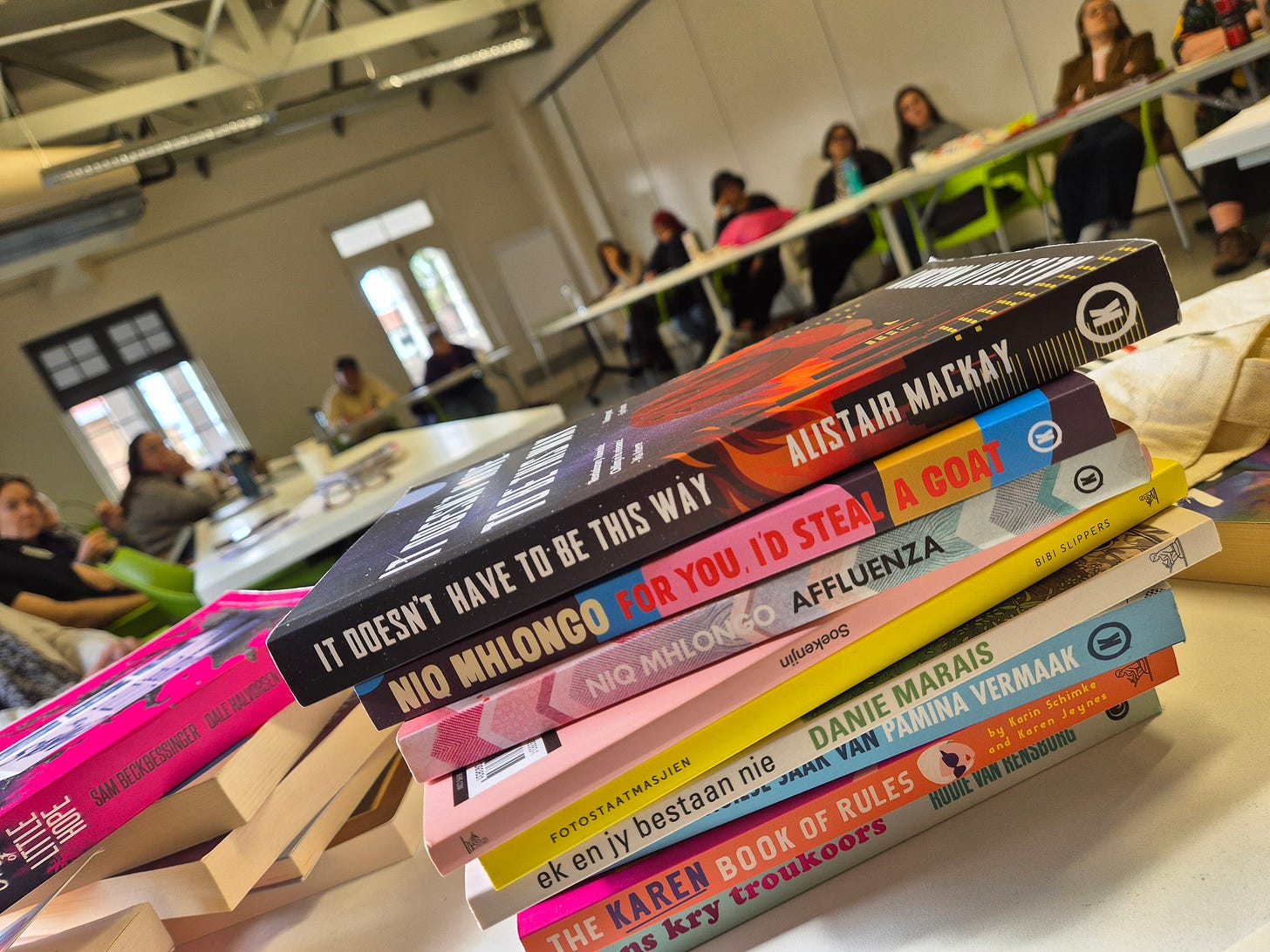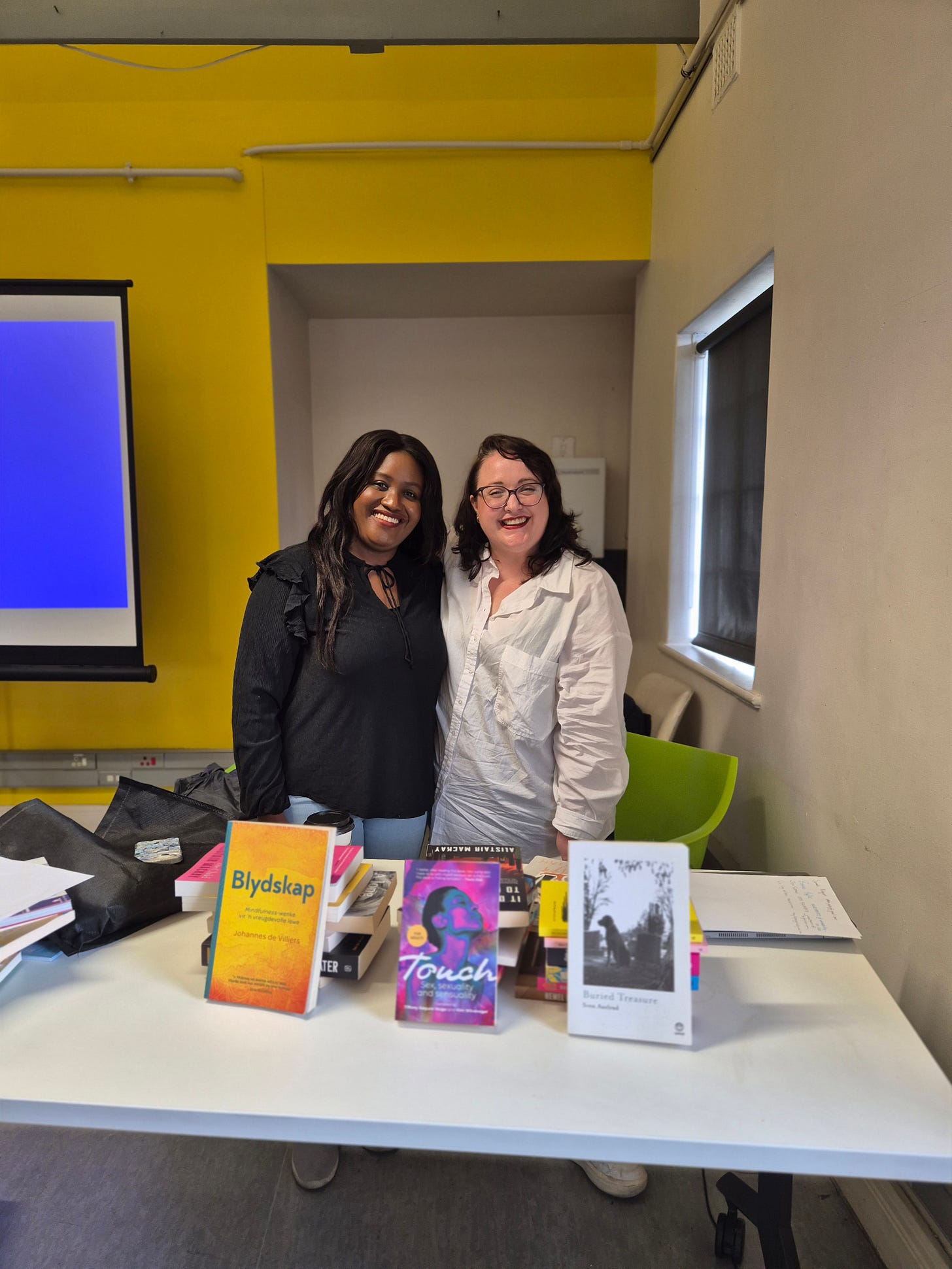Notes from a workshop on marketing your book
I recently co-presented a workshop on the topic of marketing your book in South Africa and had a blast. These are some thoughts a few days after and my DIY non-definitive book jargon dictionary.
How much do you charge for entry? What is a sub? How do I use Booktok?
These are some questions asked by participants during the Open Book workshop on Marketing Your Book in South Africa. I was a a co-presenter with bookish social media guru @sammikoalareads. My credentials? A publicist for 8 years, a content marketer before that (in the time when social media managers were a new job description), and a lifetime consumer of books. My main takeaway from our time, which can best be described as a crash course with no helmets on, is that there is a lot of mystery surrounding book publishing. And much like in life, people are too scared to ask what something is in case they look stupid for not knowing. What I loved about the people in the room with us that day was that they did not hold back. From start to finish our workshop was interactive, honest, and open. We tackled their questions there and then, but some book world mysteries could be easily solved with a listicle of sorts, a bookworm’s urban dictionary if you will. So here’s my very short, and non-definitive list of publishing jargon definitions for those who might have heard certain terms but were afraid to ask:
Book launch: An event (or events) to celebrate the journey to publishing and releasing the book. A gathering of friends, and family and an opportunity to network with potential new readers and reviewers. Great way to get the word out as it sets things in motion and gets the ball rolling! Best held in a bookshop, which also advertises to their loyal patrons, with no entry fee. Goes well with wine (some would say this is crucial to the success of a launch).
Publisher: Refers to two things: 1. It’s the/a company responsible for making, publishing, distributing, and marketing the book on behalf of the author. 2. The actual person at the company responsible for making the book (from reading the submission to signing off on the final product when it goes to print).
Publicist: The person at the publishing house or freelancer you appoint to get publicity for the book and the contact person once the book is published. After the publisher, and after the book is published, you will work mostly with the publicist.
Publicity: ‘Free’ marketing for a book. This includes reviews, interviews, excerpts, events and appearances, digital promotions, and a range of other things. The publicist also facilitates the process of getting advertisements and POS (but now we are exiting ‘free’ territory).
POS: Point of sale used for marketing purposes, often in bookshops. It can include bookmarks, posters, tote bags, banners, badges, pens, mugs … the list goes on. The main question to ask when discussing POS is, “Will this contribute to sales?”. The answer is often a very vague, unclear “maybe” and if the budget allows it’s often worth a shot. But it’s not a must!
Sub: Subscription. In trade publishing, sales representatives go to booksellers with information on upcoming books, including the cover and blurb*, and get them to sign off on stocking and selling the book. This happens a few months before the publication date*.
Blurb: A short promotional description of the book, used to give readers an idea of what the book is about. Often the blurb used for sales purposes is the same as the blurb on the back of a book but sometimes, for varying reasons, it looks different. For example, a blurb on the back of a collection of poetry might simply be a line or two from the collection and a shout* or two from well-known poets. For a blurb, the shorter the better is a good principle, but you also want the blurb to adequately convey to the reader what to expect when they read the book. A good rule of thumb is to keep it under 1000 words and remember not to give spoilers (you’d be surprised how easily that happens).
Shout: A line on the book’s front cover, and often the back cover too, to further describe it and or make readers curious. Now here I admit my own confusion! Some people use shout to refer to the tagline, others use shout to refer to the quote that is used on a cover to pull potential readers in. This quote is often by someone famous in the same genre or field and serves to offer legitimacy to your book. For example, a quote from a bestseller in the crime genre can help a debut crime novelist’s book stand out as it offers a stamp of approval from a familiar and respected person. It’s referred to as a shout because it is literally someone shouting about the book’s contents. The shout, tagline, and quote, form part of the design elements that go into making a cover pop.
Press release: The first piece of information sent to the media, influencers, and stakeholders about a book, containing the blurb and additional information about the book like the page extent, recommended retail price, and ISBN* number. It also includes information on the author and any hooks and angles that might be used to report on or sell the book.
ISBN: This stands for International Standard Book Number and refers to your book’s ID number. It’s the numbers over the barcode and is 13 numbers long. Here’s an easy explanation from the horse’s mouth: International ISBN Agency. You don’t have to get your own ISBN, your publisher does it for you. If you are self-published, you need to make sure to get one. Potential buyers of your book need this code to find you in the system.
Publication date: The date on which the book is published and released in stores. It serves as a guideline for everyone involved when the book needs to be and will be available on shelves around the country. In South Africa, we often find books available earlier than the publication date because stock gets released as soon as possible after print. The date remains important as a benchmark for publicity, digital sales and a host of other things. Sadly, on the actual date, there is no streamers and balloons or ribbons to be cut. How wonderful would that be!
During the workshop, there were also many questions related to social media concepts and actions and I think I will cover that in another newsletter. If you have a specific question, like what is booktok and how do you vlog, pop it below and I can cover that too.
I’ll end on this note:
Marketing a book, especially in South Africa, is a hustle. It’s my day job and I am so happy and lucky that it is, but it is a hustle. We are competing with so many things for media space, for customer investment and for shelf space. It’s a hustle that requires teamwork and dedication. If you are an author getting ready to publish you have to take into account that the work does not stop when you send it off to the printer. Some might say the work has only begun! But the hustle can be fun if you choose to see it that way. You get to play with your product and engage in creative spaces. See it as an opportunity, not a challenge. (Also: Read Cathy Park Kelly’s substack in which she shared thoughts on this from other authors). Remember, at all times, that people in the publishing business are your allies - from the author in direct competition with you to the librarian potentially stacking your book. We are in this together. The hustle is not a lonely game, and if it feels that way just reach out and say hey - I’m drowning. You will find so many friendly faces willing to lend a hand.
PS: I was interviewed by the incredible Sara Jayne Makwala King for CapeTalk in the build-up to the workshop and it was such a fun conversation, albeit dated now. You can listen to it here.




Thanks so much for the share, Helene! (I'd booked a ticket to your workshop but had to cancel at the last minute due to work commitments. Was so sorry to miss it!)